Nepal quake: 'No chance' to find more survivors, as death toll rises
- Published
Ian Pannell met Sherpas mourning dead relatives and saw their devastated homes
Nepal's authorities have ruled out finding more survivors of last week's earthquake under the rubble, as the death toll rises to 6,621.
"We are trying our best in rescue and relief work but now I don't think that there is any possibility of survivors," Home Ministry spokesman Laxmi Prasad Dhakal told AFP.
Nepal said 14,021 people were injured in the 7.8-magnitude quake on Saturday.
The fate of thousands of people in remote areas remains unknown.
The death toll could go up, as search and rescue efforts are still continuing in several hill districts including Dhading, Rasuwa and Sindhupalchok, relief co-ordinator Hemanta Pal said.
While the vast majority of casualties were in Nepal, about 100 people are reported to have died in neighbouring India, Tibet, and Bangladesh.
The BBC's Joanna Jolly looks at efforts to save and restore Kathmandu's Patan Durbar Square
The EU envoy to Nepal, Rensje Teerink, said on Friday that the whereabouts of 1,000 EU citizens was still unknown.
Nepal has repeatedly called for more foreign help and humanitarian aid, admitting it was ill-prepared for the disaster.
Landslides and poor weather have hampered efforts to deliver aid to isolated districts, and there are only about 20 helicopters available for the rescue and relief operations.

At the scene: Sanjoy Majumder, BBC News, Sankhu
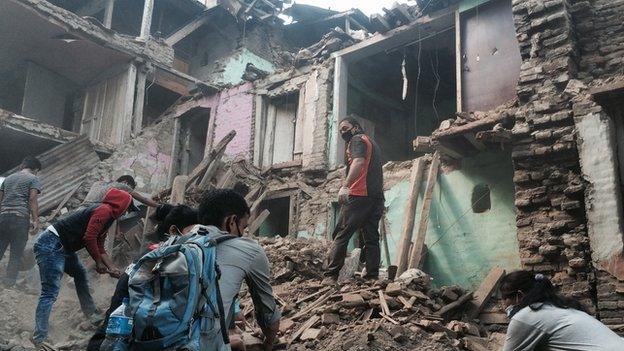
Krishna Devi Sreshta is carefully picking her way through the rubble of what was her home. It's one of about 25 houses in Sankhu, just an hour's drive from Kathmandu, that was completely destroyed by the earthquake.
She's here to see if she can salvage anything. "We were in the field when the earthquake hit," she says. "That's why we were saved."
Not everyone was so lucky. About 50 members of this community died. She points to the clothes that she's wearing. "This is what I was wearing last Saturday. It's all I have left."
Through a narrow doorway I can see the inside of her house, but it's too dangerous to go in. Everything has been removed from the house. "That was my fridge," Krishna says, pointing at some twisted remains outside. "And over there my television."
A group of volunteers arrive with shovels and spades and walk past. They are here to help. No-one else is.

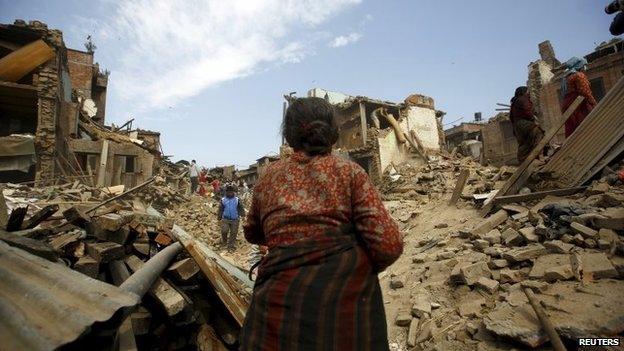
Authorities in Nepal say they expect the death toll to rise as rescuers find more victims
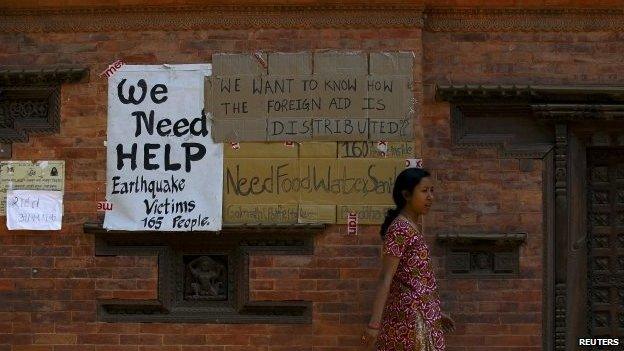
Signs in Bhaktapur, Nepal call for help and question how foreign aid is being distributed
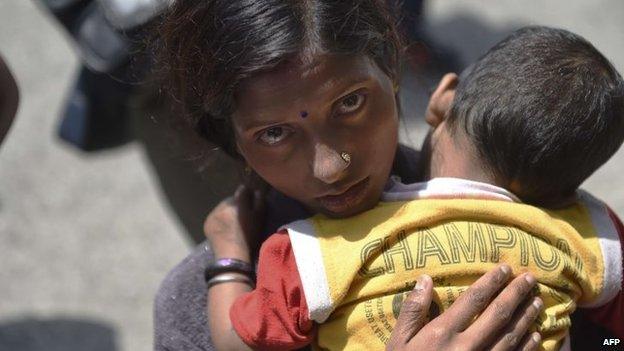
A Nepalese woman waits to be seen by medics at a disaster relief camp in Kathmandu
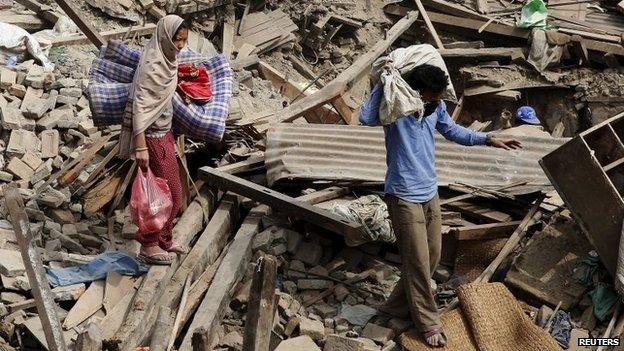
Residents of Bhaktapur carry their belongs through the rubble of destroyed houses
The country's Information Minister, Minendra Rijal told the Associated Press news agency that Nepal needed 400,000 tents but so far had only been able to hand out 29,000.
Finance Minister Ram Sharan Mahat said the country needed better food aid. "We have received things like tuna fish and mayonnaise. What good are those things for us? We need grains, salt and sugar," Mr Mahat told AP.
Nepal is also yet to receive tens of millions of dollars pledged by foreign donors, Mr Mahat said.
"Not a single dollar has been deposited into government accounts," he said.
"So, I don't say that it will not come. It will take some time but as of now the government's entire operation is entirely funded by the government's own internal resources."

Nepal earthquake relief
$415 million
needed for humanitarian relief
-
3 million people in need of food aid
-
130,000 houses destroyed
-
24,000 people living in makeshift camps
-
20 teams working to reunite lost children with their families

Unicef has also warned that children in the worst-affected areas have been left "homeless, in deep shock and with no access to basic care", with monsoon season just weeks away.
"Hospitals are overflowing, water is scarce, bodies are still buried under the rubble and people are still sleeping in the open. This is a perfect breeding ground for diseases," Rownak Khan, Unicef's deputy representative in Nepal, said.
Nepalese authorities have temporarily banned the slaughter of animals and sale of meat and fish in parts of Kathmandu in an attempt to prevent disease outbreaks.
Deaths in worst-affected areas (1 May)
